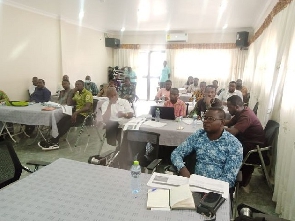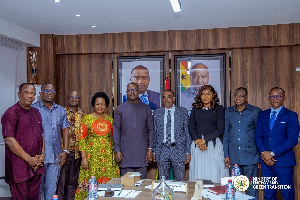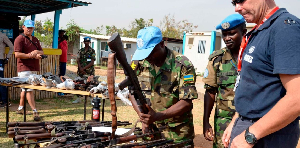As part of its efforts to help address climate change and problems of biodiversity in Ghana, Conservation Alliance International in partnership with A Rocha Ghana, CSIR-Plant Genetics Resources Research Institute (PGRRI), Ministry of Environment, Science, Technology and Innovation (MESTI), South African National Biodiversity Institute (SANBI) with funding from JRS Biodiversity Foundation through the GBIF Biodiversity Information for Development (BID) Programme organized a workshop to discuss pathways towards successful completion of the BID-AF2020-029-USE project.
The BID-AF2020-029-USE project titled ‘Integrating ecosystem and biodiversity data was to assist national development planning’ to integrate off-reserve, Other Effective Area-Based Conservation Measures (OECMs) and Key Biodiversity Areas (KBAs) into government decision making processes.
The workshop brought in more than 40 key stakeholders from government agencies, academia, and the private sector, to discuss access to Biodiversity information and why it’s important now for Ghana.
The workshop provided the opportunity for key stakeholders and partners to share impact stories, and best practices, and offer feedback to improve future interventions on Biodiversity information and how biodiversity data are thus critical to advance the sustainable development agenda.
Speaking at the workshop, Deputy Director of the Environmental Protection Agency, EPA, Ghana, Mrs. Jewel Kudjawu explained the importance of biodiversity data to the development of Ghana.
She said that Ghana needs solid biodiversity data in order to report accurately on national and global biodiversity commitments of the country.
“The information products developed under the project will be integrated government policies and plans including the National Biodiversity Policy (NBP) and the National Invasive Species Strategy and Action Plan (NISSAP)” she added.
Present at the workshop was a team of biodiversity experts from the South African National Biodiversity Institute (SANBI) led by Matthew Child, Deputy Director for Bioinformatics. SANBI has served as mentors for the BID project team in Ghana and provided useful training Key Biodiversity Area (KBA) assessment and also assisting the team in making valuable inputs into the NBP and NISSAP.
The SANBI team promised continued support for the project especially in the area of capacity enhancement.
Regional News of Wednesday, 12 April 2023
Source: Nana Yaw Reuben













